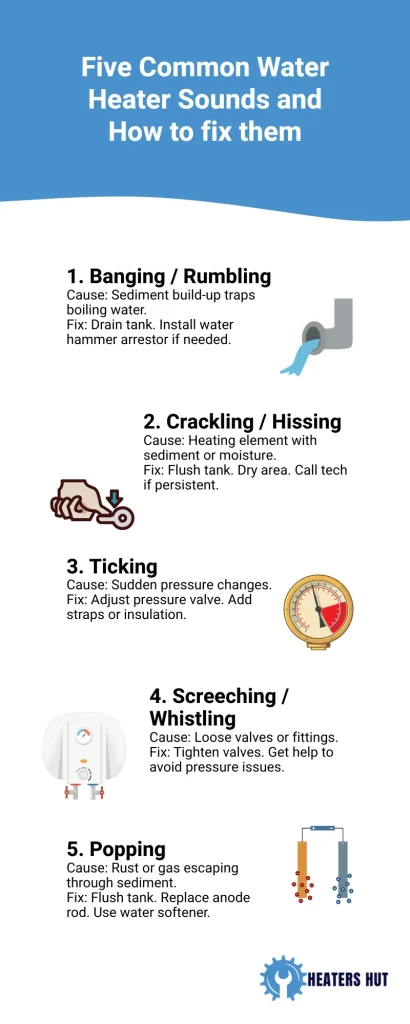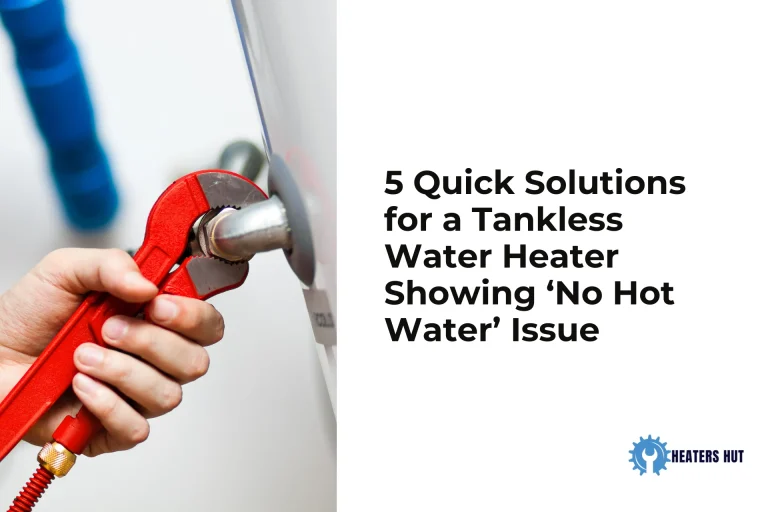Is your water heater making weird sounds? You’re not the only one hearing them. Sometimes, water heaters can make strange noises that might worry you. But don’t be scared! This guide will explain these sounds and help you understand what’s happening in your water heater. From rumbling and hissing to ticking and popping, we’ll tell you why they happen and how to fix them. So, let’s start and figure out how to have nice hot showers without the spooky sounds.

1. Why Is My Water Heater Making a Banging or Rumbling Noise?
Banging or rumbling sounds usually mean sediment has built up at the bottom of your water heater’s tank. As water gets trapped under the sediment and heats up, it boils and creates pressure bubbles. Resulting in that explosive rumble.
How to Fix It:
You can drain the tank to remove the dirt inside and fix this. Watch out for something called “water hammer,” which occurs when water suddenly stops or changes direction, causing the pipes to bang. You might need a water hammer arrestor or a valve that eases the pressure to prevent the water hammer. If the problem continues, getting help from a professional technician is a good idea.
2. What Causes a Hissing or Crackling Sound in a Water Heater?
Hissing or crackling often comes from electric water heaters. These sounds can occur when water droplets contact the hot heating element, especially if there’s sediment build-up. In gas or oil heaters, it could also indicate moisture accumulating near the burner.
How to Fix It:
To address sediment, drain the tank. Check for moisture in gas/oil heaters and dry the area if necessary. If the problem persists, consult a professional for a thorough inspection and potential repair.
3. Why Does My Water Heater Make a Ticking Sound?
Ticking sounds often result from minor pressure changes in the water lines or tank. This noise can also be caused by the metal parts expanding and contracting as they heat up. For more on pressure issues, see our guide on fixing low water pressure.
How to Fix It:
To fix this, you can change the pressure-reducing valve and add straps or insulation to quiet down the noise. If the ticking sound doesn’t go away, it’s a good idea to call a technician for more help.
4. Why Is My Water Heater Screeching or Whistling?
Screeching or whistling sounds typically point to a partially closed or loose valve. Usually on the inlet, outlet, or pressure relief valve. When water flows through a narrow opening, it creates a high-pitched sound.
How to Fix It:
Inspect and tighten the valves causing the noise. If the noise doesn’t stop, getting help from a technician is a good idea. Valve problems can mess up the temperature and pressure in your water heater, which might harm it, so it’s best to let a professional look.
5. What Does a Popping Noise from a Water Heater Mean?
Popping is often caused by gas bubbles escaping through sediment that’s built up inside the tank. It can also mean the anode rod is corroding due to hard water.
How to Fix It:
To address this, flush the tank to remove sediment and consider replacing the anode rod. A water purification system may also help prevent this issue if you live in an area with hard water.
What to Do When Your Water Heater Is Making Noises
While experienced DIYers can address some of these water heaters sounds through DIY solutions, it’s essential to emphasize the importance of professional assistance. Water heaters are complex systems and incorrect repairs can lead to hazardous situations.
Here’s what you should remember:
Rumbling:
Address sediment build-up through draining, but consider professional help if inexperienced.
Popping:
Flush the tank and replace the anode rod. Consult a professional if necessary.
Sizzling, Hissing, or Crackling:
Regularly flush and drain your tank, and be aware of the gas-powered water heaters’ differences.
Ticking:
Adjust the pressure-reducing valve and check the pipe straps.
Screeching, Screaming, or Singing:
Investigate relief valves and water lines, and call a plumber if needed.
Banging or Hammering:
Be cautious of water hammers, and consider preventive measures like water hammer arrestors or pressure-reducing valves.
Conclusion:
In conclusion, if your water heater is making strange noises, it’s essential to understand the reasons behind these sounds and how to address them. From rumbling to hissing, ticking, screeching, and popping, each noise can have specific causes and solutions. So, stay alert, address these sounds promptly, and enjoy pleasant hot showers without strange noises bothering you. Water heaters are complex systems, and incorrect repairs can lead to safety risks. Remember, maintaining your water heater ensures a cozy and trouble-free home. For more information, including why your water heater is not working at all, visit Heaters Hut.






